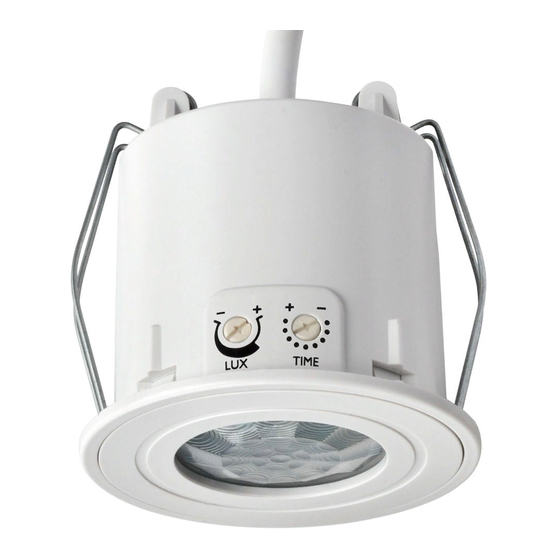DANLERS CEFL PIR Installatie-opmerkingen - Pagina 2
Blader online of download pdf Installatie-opmerkingen voor {categorie_naam} DANLERS CEFL PIR. DANLERS CEFL PIR 15 pagina's. Ceiling flush mounted pir occupancy switch
Ook voor DANLERS CEFL PIR: Snelstarthandleiding (2 pagina's)

Installation procedure
1. Please read these notes carefully before commencing work.
In case of doubt please consult a qualified electrician.
2. POSITIONING: The PIR occupancy switch (PIR) should be installed to
achieve correct coverage of the area, see diagram B. If the photocell
override facility is required, the switch must be located above an area
where daylight can give greater illumination than the artificial light.
Avoid locating this product where it is exposed to drafty conditions
(exposed lobbies, open ceiling voids or near fans) or near heat
sources. To cover large areas PIRs should be spaced in a 5 metre
grid formation.
3. The greatest energy savings will be achieved if each PIR controls
an independent set of lamps. They can be wired in parallel but this
should ideally be limited to three, see diagram E.
4. Make sure the power is isolated from the circuit.
The PIR should be connected as shown in diagrams C & E:
Brown
L
Live in
Blue
N
Neutral in
Black
SL
Switched Line out ('A' terminal of Klik-AX plug)
Start-up mode
When the PIR is powered up, it will switch on the load for 1 minute, the
load will then switch off and the PIR will enter its Operating Mode. If a
manual override-off switch is positioned before the PIR in the circuit
(diagrams C & E, note 1) it will do this each time the wall switch is switched
on. Alternatively, if the wall switch is placed after the PIR (diagrams C
& E, note 2) it will not enter the start-up mode each time.
Time and Lux set-up
For convenience, ensure that the TIME is set to the minimum when
setting up the LUX level. Afterwards set the TIME to a value suitable
for the application, making reference to diagram B.
The LUX is best set up when the local ambient light is at approximately
the minimum desired working light level, a lux meter placed on the
surface under the PIR may help. With the LUX set fully clockwise wait
for the PIR to switch off. Rotate the LUX adjuster slowly anticlockwise
(- to +), whilst waving your hand approximately 1m below the PIR, until
the load switches on.
A: Mounting diagram
Clearance hole
63 or 64mm (2.5") diameter
B: Detection diagram
For optimum coverage
recommended mounting
height: 2.4 to 5m
up to 5m
up to 7m
C: Wiring diagram, single PIR
Note 1: Optional
Note 2: Alternative
position for optional
manual wall switch
wall switch
for overriding off.
L
SL
L
N
230 VAC
N
E: Wiring diagram, multiple PIRs
Note 1: Optional manual wall switch
for overriding off
L
L
L
N
N
SL
SL
230 VAC
N
Springs can either be left closed (down
the side of the product) or opened out.
Strong detection zone
i.e. person moving arm
or walking towards PIR
Secondary detection zone
i.e. person walking
perpendicular to PIR
D: Adjusting time and lux
Typical settings
min
max
max
LUX
∞
100
1000
load
5m
Note 2: Alternative
position for optional
wall switch.
L
N
SL
load
min
TIME
40s
1m15s
2m30s
